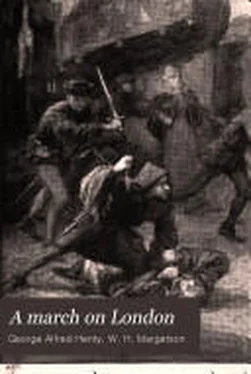He cut with his dagger the silk that bound the roll of parchment together.
The king read the letter carefully, and when he concluded said:
“Truly, young sirs, you have borne yourselves right gallantly and well; Sir Hugh Calverley speaks strongly indeed in your favour, and says that he owes his freedom if not his life to you. And now, tell me, think you that Ypres will be taken?”
“I fear not, your Majesty,” Edgar said. “I thought that the siege of Oudenarde was worse conducted than anything I had ever read of, but the siege of Ypres is to the full as faulty. The place is strong and stoutly defended, and it can only be taken by regular works erected against it and machines placed to batter a breach. Nothing of this sort has been attempted. The troops march valiantly against the walls, but they throw away their lives in vain; and if, as is said, the French king is marching to its assistance with a strong army, there will be naught for us but to retreat to the ports unless strong aid arrives from England.”
“But the bishop has some eight thousand Englishmen and twenty thousand Ghentois,” the king said. “Surely we might fight and win, as our grandfathers did at Crecy.”
“Yes, sire; but the English army at Crecy was commanded by a king, and was composed of good fighting men, with a great number of knights and nobles to lead them. The army in Flanders is commanded by a bishop, and there are many of the men who have gone over for the sake of plunder, and they will make but a poor stand in battle.”
“My uncle of Lancaster has gathered a large force, and is ready to cross over to their aid,” the king said.
“So we have heard by the way, sire, and if he joins the bishop all may be well, for his authority would be paramount, but at present he has not crossed, and unless he arrives before the King of France, things will assuredly go badly with the bishop.”
“I have no doubt that Sir Hugh has set forth these matters in his letter to the council,” the king said, “but assuredly Lancaster should be there in time. And now, tell me how you made your escape from Ypres.”
Edgar related the circumstances.
“Your captor was an honourable gentleman,” the king said, “and it is well that you escaped, for these Flemish burghers are masterful men and might well have murdered you. I must now to the council; I have summoned it to assemble. Have you been home yet?”
“No, sire. Our first duty was to bring you the letters, but, with your permission, we shall ride down into Kent tomorrow.”
“Do you know that your friend Van Voorden has again returned to London? He found that he could do naught in Flanders, which at present is wholly at the orders of the King of France.”
They rode first to Sir Robert Gaiton's house, where, as always, they were welcomed most warmly, and Albert narrated their adventures in Flanders, and how they still owned the armour he had given them.
After staying there for some time they went to the house where Van Voorden was lodging, having obtained his address from Sir Robert Gaiton. They had not seen him since they had parted from him in Ghent, a year before.
“I thought you intended to settle in Flanders, Mynheer,” Edgar said, after the first greetings were over.
“I hoped to do so, and after I left Antwerp I went to Louvain and took a house there, but when the King of France defeated and killed Van Artevelde, and all Flanders save Ghent came under his power, the country was no longer safe for me. It was known, of course, that I was for many years here, and that I had done all in my power to effect a league between Ghent and England, so three months ago I crossed hither, leaving my wife and daughter at Louvain. I stopped for a short time at Ghent, and had much to do with bringing it about that Ghent should send an army to assist the English; but I fear that the doings of the bishop's troops—the sacking of towns by them—has so set the Flemings against England that there is no hope of a general alliance being made with Flanders.
“There were other things for which I wished to come over. I had hoped to return before this, but matters seem to be going on but badly, and if the King of France and his army defeat or drive out the bishop, his power will be greater than ever in Flanders, and in that case I shall send for my wife and daughter to come over again, and establish myself here finally.”
On taking leave of them he handed a wooden box to each, saying:
“I pray you not to open these until you reach home.”
The next day Edgar and Albert rode down into Kent. Great was the surprise that their presence excited when they arrived at De Courcy's castle. Aline ran down into the courtyard and embraced her brother warmly, and then, as was the custom, held up her cheek to be kissed by Edgar.
“What, tired of the wars already?” she said, laughing. “Or have you killed all your enemies? or how is it that you are here?”
“We have been prisoners, Aline,” her brother said, “and have been bound to take no farther part in the war.”
“Prisoners!” she repeated; “you are joking with me, Albert. Surely you and Edgar would never have surrendered unharmed?”
“Nor did we, Aline. I was cut down and stunned by the blow of a mace, and was lying insensible.”
“And what was Edgar doing?” she asked, looking reproachfully at him.
“Edgar was not near me when I was struck down, Aline, but no sooner did I fall than he, with his man-at-arms, Hal Carter, stood over me and kept at bay a host of knights and soldiers, and slew so many that they were glad at last to give him terms of surrender.”
The girl's face flushed, and she would have spoken had not Sir Ralph and her mother at that moment issued from the door.
“Why! what brings you home, lads?” Sir Ralph asked, heartily.
“They have been taken prisoners, father,” Aline interposed, “and Albert has been wounded, and they have both been obliged to give their parole not to serve again through the war.”
“That is bad news indeed,” the knight said. “It means another farm gone, and perhaps two, to pay for Albert's ransom. However, it is the fortune of war. Now come in and tell us all about it; but doubtless you are both hungry, and the matter will keep till you have dined. The meal is already on the table. You are not looking much the worse for your wounds, Albert,” his father went on as they seated themselves at table.
“I have been healed of them for the last month, father. I was brought down by the blow of a mace, which would have finished me had it not been for the good work put into my helmet by the Milanese armourer. Also I had a wound on the neck, but fortunately it was not very deep.”
“And did you come out of it scatheless, Edgar?”
“Nearly scatheless, for I knew not that I had been wounded until the fight was over, and it was but a pike thrust that entered at the shoulder-joint and cut the flesh thence to the neck. It was but an affair of a bandage and a bit of plaster. The only one seriously hurt was Hal Carter—it was some three weeks before he began to mend. He had half a dozen wounds. Another of my men was killed and two of Albert's.”
“Now let us hear all about it,” Sir Ralph said when the meal was over; “that you bore yourselves well I have no doubt, but I would fain hear the details of the matter.”
Albert told the whole story of the assault and the escape, interrupted by Edgar, who protested that Albert was always belittling his own doings, and giving him credit when everything had been done equally by them both.
“You blame Albert unjustly, Edgar,” Sir Ralph said when the story was concluded. “Albert has behaved well, but he has neither your strength, your skill, nor your quickness. It was you who thought of carrying the broken ladder to another spot, and so taking the besieged on the wall by surprise, and you were the first to mount it. It was you who, when you saw that the case had become altogether hopeless, ordered the soldiers to save themselves, while you held the enemy at bay. Albert would like enough have been killed, had you not so stoutly defended him that they gave terms of surrender to you both. You, again, had the idea of making your escape along the roofs, and took the lead in it. There is all credit due to Albert that he well seconded you, but it was you who led. Again, it is probable that neither he nor your man-at-arms would have been able to cross those half-frozen ditches, had you not first broken the ice for them and then dragged them over. You have done wonders for Albert, but you could not accomplish miracles. You have transformed him from a weakling into a brave young knight, of whom I am proud, but you cannot give him your strength or your quickness. If you go on as you have began, Edgar, you will become a famous captain. He will remain, and will be content to remain, your companion and lieutenant. What have you in those boxes that were strapped behind your saddles?”
Читать дальше












